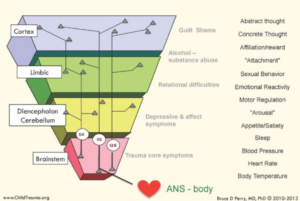From ACEs Connection: “[Dr. Bruce Perry] shared with us that while he is gratified that the [ACEs] study has finally begun to inform current healthcare practices, he cautions against the oversimplified application in the form of universal ACE screening. In a recent tweet he wrote:
We need to keep reminding everyone of the complexities of development and the importance of acknowledging individuals as unique. Relational health is more influential on health outcomes than adversity. ACEs are not actionable (unless ongoing). Relational poverty is..
The story of Mr. Rogers and Senator Pastore demonstrates how we change the way we think and behave when we feel something in the context of a relationship. Simply giving information is usually insufficient to effect change. […]
The ACE study has profound implications for a wide range of settings. But before we rush to implement universal ACE screening in healthcare, we need to recognize the limits of information in effecting change. When we connect in relationships at the level of feelings, not simply words, meaningful change occurs. […]
For professionals, the ACE study provides a critical frame to ‘inform’ the way we listen to the story. But this frame does not translate into giving patients information about the effects of trauma on long-term health. Without sufficient relational support, such information might be deeply destabilizing.
In a previous post I suggest we replace the word ‘screening’ with the word ‘listening.’ Screening is something you give to someone while listening is something you do with someone. As Dr. Perry shows, current relational health buffers against adversity. Offering space and time for the kind of connection we observe between Mr. Rogers and Senator Pastore may be just the ‘action’ that is needed.”












